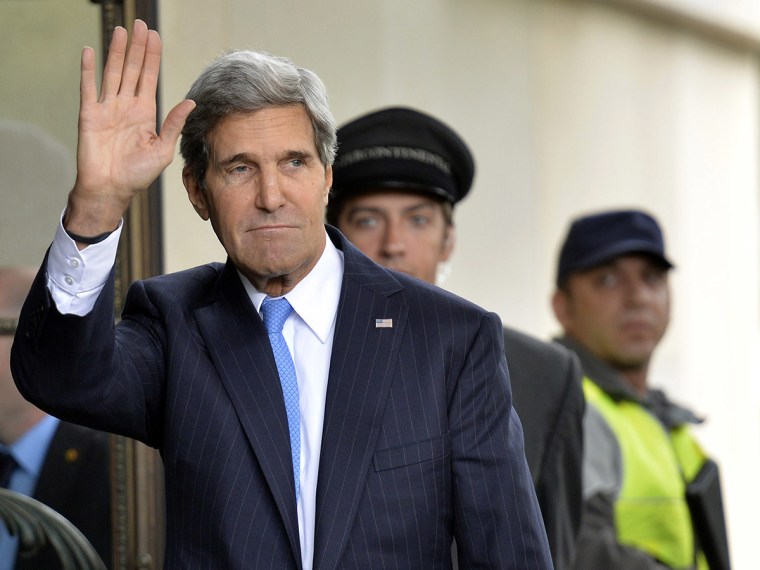UPDATED at 3:10 p.m. - Pledges for diplomacy were "not a game," Secretary of State John Kerry warned while meeting with his Russian counterpart in Geneva Thursday as the two countries try to broker a deal that would take chemical weapons out of the hands of Syrian President Bashar al-Assad.
"Together we will test the Assad regime's commitment to follow through on its promises," Kerry said from Switzerland just prior to his meeting with Russian Foreign Minister Sergey Lavrov.
Reading from prepared remarks, Kerry spoke frankly of the "share of disagreements" that remain between the two countries on Syria, an ally of Russia.
"Expectations are high. They are high for the United States—perhaps even more-so for Russia to deliver on the promise of this moment," Kerry said. "This is not a game. It has to be real. It has to be comprehensive. It has to be verifiable. It has to be credible. It has to be timely and implemented in a timely fashion."
Most importantly, Kerry said, there must be consequences. For the last several weeks, President Obama, along with Kerry, have made their case to Congress, Americans, and the international community, pressing for military action after it said it found irrefutable proof of the use of chemical weapons by the Assad regime. But an opening for diplomacy, ostensibly forged by an off-the-cuff remark from Kerry earlier this week, re-routed the administration away from a military strike. Kerry on Thursday said the president has reiterated "again and again" that a peaceful resolution was "clearly preferable to military action." However, the United States has sought to keep military action an option on the table should either side shirk on their commitments—a threat Russia wants removed.
Speaking through an interpreter, Lavrov on Thursday said any strike against Syria was unnecessary. He added that Russia was “firmly convinced that we should follow the peaceful way of resolution to the conflict.”
Obama administration officials accuse Assad's regime of launching chemical attacks on its own people last month, killing over 1,400, including more than 400 children. Assad has rejected the accusations, but does admit to possessing chemical weapons. In a rare interview Thursday, Assad said his allies in Russia deserved credit for brokering the talks of diplomacy. “The U.S. threats did not influence the decision,” he said, according to reports on an interview Assad gave with the Rossiya-24 network. The Syrian leader added that within "the next couple of days," his regime would send documents to the United Nations to join a convention that prohibits chemical weapons.
Kerry said the U.S. was looking for more affirmative action from Syria. "The words are simply not enough," he said.
General Salim Idris, rebel leader of the Free Syrian Army, accused the Syrian regime and Russian administrations of just "playing games and wasting time," in an interview with NBC News' Andrea Mitchell.
Meanwhile, the CIA is following through on promises to supply military assistance to Syrian rebels and has begun to arm the opposition groups warring against Assad, U.S. officials confirm to NBC News.
According to the Washington Post, the shipments of supplies, which include small arms, vehicles and medical supplies, began flowing into Syria over the past two weeks.
After more than two years of resisting calls to intervene in Syria’s civil war, the White House in June pledged to arm vetted opposition groups. Secretary of State John Kerry in April promised to expedite the military assistance to “have an impact” within a “matter of weeks.”
Top U.S. officials, however, downplayed the impact of these arms, telling NBC News it is unlikely the U.S.-supplied weapons will help “tilt the balance.”
The scope of additional U.S. action in Syria remains in flux as world leaders negotiate a possible diplomatic approach to disarming Assad’s chemical weapons stockpiles. Sen. John McCain, an outspoken supporter of the U.S. supplying aid to the rebels, chided the Obama administration for not doing more to help the efforts of the opposition groups. “Nothing will drive Syrians more into the hands of extremists than to feel that they have been abandoned by the West,” he said on Morning Joe Wednesday.
